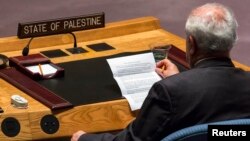Palestinians are making a push for a vote on a U.N. Security Council resolution setting out parameters and a two-year deadline for Israel’s withdrawal from their lands.
Palestinian officials said Sunday they would seek a vote as early as Wednesday. But Monday morning, Palestinian U.N. envoy Riyad Mansour was more cautious on when a vote would take place.
“On Wednesday, most likely, a draft will be put in blue,” he said.
In diplomatic-speak, a resolution is “put in blue” ink 24-hours before the council votes on it, but a vote is not required to immediately follow and sometimes never does.
Non-permanent member Jordan has acted on behalf of the Palestinians in the Security Council, circulating their proposed resolution earlier this month. Ambassador Dina Kawar said as of Monday morning her delegation had not been approached about a vote this week. She noted that U.S. Secretary of State John Kerry is in Europe for meetings with other ministers and said they are awaiting that outcome.
Secretary Kerry met with Israeli Prime Minister Benjamin Netanyahu in Rome on Monday and is due to meet next with EU and French officials in Paris, then go on to London.
The Europeans are working on their own possible text on the Israeli-Palestinian question. It also has a timeline, but one for completing peace talks, rather than the November 2016 deadline for ending occupation that the Palestinians want.
The Security Council has not adopted a resolution on the peace process since 2008, when it endorsed the Annapolis peace talks. Diplomats say the Council cannot continue to remain silent on the matter, particularly as tensions between the two parties have escalated.
The prospect of a U.S. veto in the Council is one reason for the previous lack of action. But diplomats say privately that an American veto is not as certain as it once might have been.
While Washington is unlikely to support the idea of a timeframe and other aspects of the Palestinian-drafted resolution as it is, the administration is making efforts to engage with various stakeholders as evidenced by Secretary Kerry’s shuttle diplomacy.
Diplomats say there is a brief window of opportunity to act now, noting the closer Israel’s March elections draw, the less flexible the country’s hardline politicians will become.
In Europe too, there is a changing political environment, with non-binding votes in several parliaments urging recognition of a Palestinian state.
The U.N.’s special coordinator on the peace process, Robert Serry, warned the council Monday that if the current deadlock is not broken, the two-state solution is at risk of becoming a one-state reality.
For any Security Council resolution to be adopted it needs a majority nine votes and no vetoes from the five permanent council members.




